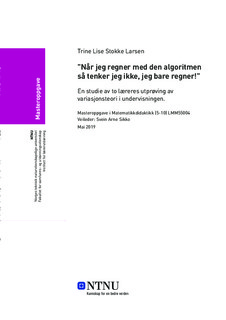| dc.contributor.advisor | Sikko, Svein Arne | |
| dc.contributor.author | Larsen, Trine Lise Stokke | |
| dc.date.accessioned | 2019-08-23T14:08:57Z | |
| dc.date.available | 2019-08-23T14:08:57Z | |
| dc.date.issued | 2019 | |
| dc.identifier.uri | http://hdl.handle.net/11250/2610405 | |
| dc.description.abstract | «Når jeg regner med den algoritmen så tenker jeg ikke, jeg bare regner!» En studie av to læreres utprøving av variasjonsteori i undervisningen, er en kvalitativ studie av to læreres forsøk på å ta i bruk prinsipper fra variasjonsteori i planlegging, undervisning, evaluering og endring av undervisning i matematikk.
Jeg har i min over 20-årige lærerkarriere, erfart at matematikkundervisningen elever i stor grad har fått og fortsatt får om blant annet multiplikasjon, kjennetegnes av algoritmetrening. På bakgrunn av dette hadde jeg et ønske om å finne ut hvordan en kan tilrettelegge for god undervisning. Hvordan lærere kan formgi en undervisning hvor elever kan utvikle den matematiske kunnskapen som stimulerer til videre læring.
Den teoretiske rammen for studien har et variasjonsteoretisk perspektiv, med utgangspunkt i Ference Martons variasjonsteori om læring og Gu Ling-yuans bianshi jiaoxue (teori om variasjon). Begge teoriene legger vekt på systematisk bruk av variasjon og uforanderlighet i undervisning og læring (Pang, Bao & Ki, 2017). Disse to teoriene er koblet sammen til et teoretisk rammeverk kalt variasjonsteori, på bakgrunn av blant annet det Pang et al.(2017) sier om at teoriene utfyller hverandre. Getie og Dings (2018) rammeverk har fungert som en guide i mitt arbeid.
I undersøkelsen samtaler jeg med og observerer Bjørg i planleggingssituasjoner, undervisningssituasjoner og evaluerings-/endringssituasjoner. Via et lærerperspektiv blir våre tolkninger og tanker om hva variasjonsteori er og hvordan vi kan ta det i bruk, løftet fram.
Det er følgende seks variasjonsteoretiske prinsipper, tolket og tatt i bruk, som blir belyst i studien:
• Læringsobjekt
• Kritiske faktorer
• Begrepsvariasjon
• Prosedyrevariasjon
• Variasjonsmønster
• Variasjon og uforanderlighet
Studien viser at overgangen mellom nåværende praksis og ønsket praksis, gjennom å tilegne seg ny teori, er stor når det gjelder formgivning av undervisning. Dette er særlig markert i prinsippet om begrepsvariasjon.
Studien aktualiserer ny forskning på matematikkundervisning med fokus på endret undervisningspraksis. Avslutningsvis hevdes det at lærere kan forbedre undervisningen i matematikk ved å ta i bruk prinsippene fra variasjonsteori. | |
| dc.description.abstract | “When I calculate by that algorithm, I don't think, I just do it!” A study of two teachers` trying out variation theory in teaching is a qualitative study of two teachers' attempts to apply principles from variation theory in planning, teaching, evaluating and changing teaching in mathematics.
Over the course of my career, I have found that the teaching students have received, and still receive in mathematics, to a large extent are characterized by algorithm training. This is also my experience when the teaching focuses on multiplication. On the basis of this, I had a desire to find out how one can facilitate good teaching. How for example teachers can design teaching, whereby students can develop the mathematical knowledge that stimulates further learning.
Variation theory as a theoretical framework for this study is based on Ference Marton's theory of variation and learning and Gu Ling-yuan's bianshi jiaoxue (theory of teaching with variation). Both theories emphasize the systematic use of variation and invariance in teaching and learning (Pang et al., 2017). These two theories are connected in a theoretical framework called variation theory, based on, among other things, what Pang et al. (2017) says about the theories complementing each other. Getie and Dings (2018) framework has served as a guide in my work.
In the survey, I converse with and observe Bjørg in planning and teaching situations and also evaluation /change situations. Through a teacher `s perspective, our interpretations and thoughts about what variation theory is and how we can use it, are highlighted.
There are six principles from variation theory interpreted and applied, which are elucidated in the study:
• Object of learning
• Critical aspects
• Conceptual variation
• Procedural variation
• Patterns of variation
• Variation and invariance
The study shows that the transition between current practice and desired practice by acquiring new theory can be a struggle when it comes to the design of teaching, and that this is particularly marked in the principle of conceptual variation.
The study reveals new research on mathematics teaching with a focus on changed teaching practice. Finally, it is claimed that teachers can improve the teaching of mathematics by applying the principles of variation theory. | |
| dc.language | nob | |
| dc.publisher | NTNU | |
| dc.title | Når jeg regner med den algoritmen så tenker jeg ikke, jeg bare regner! En studie av to læreres utprøving av variasjonsteori i undervisningen. | |
| dc.type | Master thesis | |
